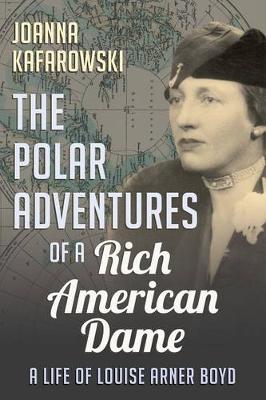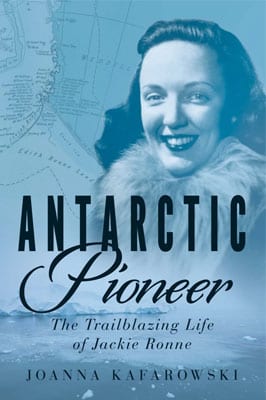Joanna Kafarowski is a Canadian writer and academic who has lived a life devoted to all matters polar, specializing in gender and indigenous issues, and consulting for government and non-profit organizations.
 She has also written two books on early women polar explorers, the first called The Polar Adventures of a Rich American Dame: A Life of Louise Arner Boyd published in 2017, and Antarctic Pioneer: The Trailblazing Life of Jackie Ronne both published by Dundern Press. I talked to Joanna about her books and her general fascination with the Arctic.
She has also written two books on early women polar explorers, the first called The Polar Adventures of a Rich American Dame: A Life of Louise Arner Boyd published in 2017, and Antarctic Pioneer: The Trailblazing Life of Jackie Ronne both published by Dundern Press. I talked to Joanna about her books and her general fascination with the Arctic.
Your latest book Antarctic Pioneer: The Trailblazing Life of Jackie Ronne is about the first American woman to visit Antarctica, Jackie Ronne (who was part of the 1946-48 expedition commanded by her husband Finn Ronne). What were some of the specific challenges that she faced being one of the only two women on that expedition?
Jackie Ronne and her husband planned the Ronne Antarctic Research Expedition for several years before it took place but she never intended to go along. This was very much a last minute decision. While in Antarctica, Jackie was regarded as the boss’s wife and was rarely able to lower her guard. Early on, conflict developed between her husband and the chief pilot which ended in the pilot being fired. The other woman on the expedition was the pilot’s wife so, out of loyalty, the two women rarely spoke after that. During the expedition, Jackie worked as the communications expert, historian and assistant scientist and she also counselled her husband. In the event of his death, she would have taken over as the leader. Like all the other expedition members, she was subject to the lack of privacy, monotonous diet, primitive living conditions and harsh weather. All in all, she carried a heavy burden of responsibility.
Your first book The Polar Adventures of a Rich American Dame was about Arctic explorer Louise Arner Boyd. It seems like she was a big personality living a very interesting life, being both an explorer of multiple expeditions and an American socialite. Why is it do you think that not a lot has been written about her apart from your book?
Louise Arner Boyd was unmarried and had no children unlike most of her male colleagues including Robert Peary, Richard Byrd and Vilhjalmur Stefansson. Their families were instrumental in maintaining each man’s legacy as a heroic explorer through the creation of a physical archive affiliated with a respected institution. The Peary-Macmillan Arctic Museum at Bowdoin College, the Byrd Polar and Climate Research Center at Ohio State University and the Stefansson Collection on Polar Exploration at Dartmouth College are a few of the permanent repositories that memorialize the accomplishments of one man. Louise Arner Boyd had no close relatives to ensure her extraordinary legacy as a polar explorer would be protected. Her gender played a role as well. The fact that she was a woman meant that her precious journals, maps, films and photographs were not treated with as much respect and care as that of her peers and subsequently, much of this valuable material remains missing.
What is a fascinating fact about Louise Arner Boyd or Jackie Ronne that you didn’t write about in the books?
As an Arctic expedition leader in the early twentieth century, Louise Arner Boyd struggled mightily against the prejudice she encountered on the basis of her gender, age and class. Whether dealing with a patronizing young scientist fresh out of university, an experienced ice-master, the head of a respected geographic organization or an eager reporter, Boyd adroitly countered each disparaging remark with aplomb. Despite her lack of a formal education and operating outside the old-boys network of polar exploration, she earned the respect of her peers and was the recipient of honours and awards during her lifetime. She presented a very assured, confident façade to the world so I was surprised to learn that Louise Arner Boyd was actually a shy person who grappled with insecurities. I located notebooks filled with jokes and amusing anecdotes in her handwriting that she used at appropriate moments in social situations. I knew she was a skilled conversationalist, whether in the Arctic or in high society, but I had not known that this came at a great personal cost.
Who are your favourite writers on the subject of polar exploration and what specific books would you recommend?
Many readers are familiar with the polar classics so I won’t mention them. Some of the contemporary titles I’ve enjoyed include books that focus (not surprisingly) on women.
I loved Jennifer Niven’s Ada Blackjack about the little-known Iñupiat woman who was the sole survivor of a 1921 expedition to Wrangell Island and Ken McGoogan’s Lady Franklin’s Revenge about the indomitable wife of Sir John Franklin. I think the poetry collection Approaching Ice by Elizabeth Bradfield is a real gem and for a book that combines polar exploration with climate science, I’d recommend The Ice at the End of the World by Jon Gertner.
Having spent years studying and visiting the polar regions, what do you see as the main impacts of global warming on the communities that live there as well as the future of polar exploration?
I think global warming is affecting or will affect all aspects of life in the Arctic. To date, the livelihoods of residents and the economy of small, traditional coastal communities have been most adversely affected because of the reliance on subsistence activities such as hunting and fishing. Shifting ice conditions and rising ocean temperatures currently represent the greatest threat.
Before you dedicated your time to writing full time, you were an academic involved in many different geographical and polar-themed societies and consulted for governments and non-profit organisations. This seems like a very busy life. Do you miss being so involved in this side of things, or are you enjoying the relatively solitary life of a writer?
About fifteen years ago, I made the decision to commit my working life to writing about women and exploration and specifically, women and polar history. I am passionate about sharing the lives and remarkable accomplishments of these women and so write books, articles and reviews for both general and academic audiences and I’m also active on social media. In fact, my pace of work has not slowed down at all! I usually work every day and I feel restless and unsettled if I am away from it for too long. I’m just as involved with various geographical societies as I was before. So my life is not too solitary.
What is your favourite place to visit in the Arctic?
The Arctic is a region which makes my heart sing but I would be hard pressed to name only one place. I’m a proud Canadian and love working in Nunavut, the Northwest Territories and the Yukon. I’ve had splendid times in Alaska, northern Norway and Svalbard. But for me, Greenland is an exceptionally evocative place and I can’t wait to return.
What do you think attracts people to visiting the ice?
I believe that people are either drawn to the spirit of extreme environments or they’re not. For me, visiting the ice resonates deeply inside and it is when I visit polar regions that I feel most at home. I also love the wildness of the desert. These are not easy environments and this is part of the attraction.
Apart from the cold, what is the most challenging aspect when visiting these regions?
In fact, I hate the cold! When visiting polar regions, the temperature never matters much to me as long as I am warmly dressed and dry. Other challenging aspects include the cost of travelling to Antarctica and the Arctic, limited infrastructure for visitors, limited healthcare services in case of emergency, dealing with different languages and understanding and respecting different cultural traditions. But accepting these challenges is part of the adventure.
What can we expect from you in the future? Got any projects on the go or book ideas on your mind?
Antarctic Pioneer The Trailblazing Life of Jackie Ronne... I’ll be busy promoting it this year. I have also begun preliminary research for an exciting new project which will be a more wide-ranging book about women’s polar history. Stay tuned for more details!
What’s your favourite thing about public libraries and in what ways do you normally use them?
I have powerful childhood memories of visiting my local library and escaping into magical wonderlands. Sadly, funding cuts to many public library systems have threatened the existence of smaller libraries and an over-reliance on technology means that the ability to leisurely browse for hours has been diminished. But I’m a scholar and a writer as well as a zealous reader so libraries will always be a major part of my life. I love talking about audacious polar women with library groups and book clubs either in-person or by Zoom and reference librarians around the world have been invaluable assets to me during my research. Librarians rock!
Find more
- Titles about Arctic exploration
- Titles about Antarctic exploration
- Biographies of women explorers
Djunaidi
Tūhuratanga | Discovery, Level 3, Tūranga




Add a comment to: Joanna Kafarowski – “The Arctic is a region which makes my heart sing”